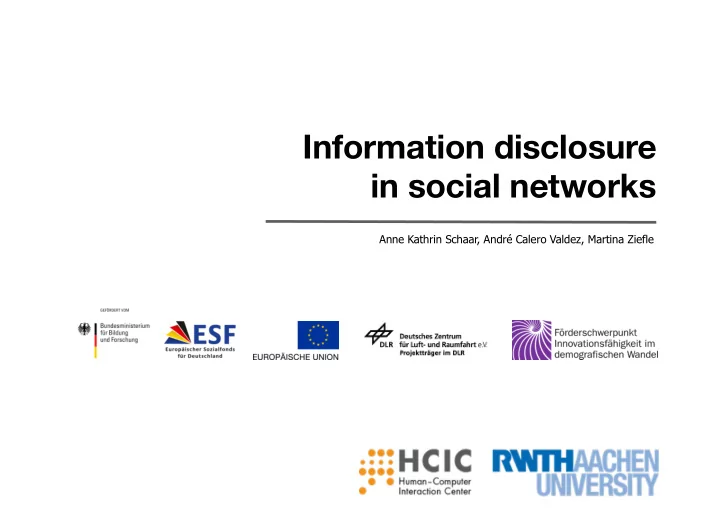

Information disclosure in social networks Anne Kathrin Schaar, André Calero Valdez, Martina Ziefle
Agenda § Background Information, motivation – Changes in working world – Social network services – a potential solution? – The project iNec § The study: „Information disclosure in social networks” – Research design – Research questions – Sample – Central findings § Discussion, limitations, future work
The working world in an upheaval § Change from production to innovation § New working time models – Parental leave, stay abroad, home office § Demographic change – Shrinking workforce though Retirement of baby-boomer generation – Lack of knowledge
Central needs of the working world § Change from production Support of communication and networking facilities of a to innovation company as a central key for innovation § New working time models – Parental leave, stay abroad, Structures that are supporting networking independent from home office time and location § Demographic change – Shrinking workforce though Solutions to compensate the loss of knowledge Retirement of baby-boomer generation Sustainable knowledge – Lack of knowledge storage, managements and exchange
Social networks - a potential solution? Social network approach Supports communication - Supports collaboration - Represent social structures - Intelligent knowledge storage - Successful private SNS - http://www.gsn-norderney.de/wp-content/uploads/soziale-netzwerke.jpg
Social networks - a potential solution? Social network approach Are social network services a Supports communication - suitable tool to face the Supports collaboration - upheaval in the working Depict social structures - context? Intelligent knowledge storage - Successful private SNS - Is the social network approach transferable into the working context? http://www.gsn-norderney.de/wp-content/uploads/soziale-netzwerke.jpg
The research project iNec Are social network services a suitable tool to face the challenges of the demographic change in the working context? Is the social network approach transferable into the working context? Interdisciplinary team: practice and research partners § – Human resources and organizational development – User-centered community design – Technical development and implementation – Integration and testing in the field
Study: „Information disclosure in social networks .“ Which personal information do users want to share in private and business contexts?
Research design § Questionnaire study – Online survey – Independent variables • Age • Gender • Perceived locus of control over technoloy (PLoC) • Personality (FFM)
Research design § Questionnaire study – Online survey – Independent variables • Age • Gender • Perceived locus of control over technoloy (PLoC) • Personality (FFM) – Dependent variables • Set of personal data
Research questions RQ1: Is there a difference in the willingness to disclose data between private and business context? RQ2: Does gender influence the willingness to disclose data in different contexts? RQ3: Does age influence the willingness to disclose data in different contexts? RQ4: Does PLoC influence the willingness to disclose data in different contexts? RQ5: Does personality (FFM) influence the willingness to disclose data in different contexts? RQ6: Is there an impact of moderating variables on the willingness to disclose data?
The sample § N=151 § Age: M=27 SD=8.0 § High educational level § Bias to female participants: ( � = 89; � =62) § High level PLoC § Social media savvy sample
Results: data disclosure private vs. business
Results: data disclosure private vs. business Non-parametric Friedman Tests revealed a significant difference
Results: age Does age influence the willingness to disclose data? § Private: address (work) , phone (work and mobile) § Older persons are more willing to disclose their work address § Younger persons are more willing to disclose their phone numbers
Results: gender Does gender influence the willingness to disclose data? § Private contexts: sex, private phone number § Women are less willing to disclose these information § Business context: mobile phone § Women are less willing to disclose this information
Results: PLoC Does PLoC influence the willingness to disclose data? § Business: religious affiliation § Persons with a high level of PLoC are more willing to disclose this information
Discussion There is a difference between the context but results only revealed § little influence of user diversity Age and Gender are predominantly influencing the private usage § scenario PLoC has only little influence § Age and gender support existing stereotypes §
Limitations Analysis were limited to non-parametric test § Sample was young and social media savvy § Limitation to personal data § Motives behind the willingness to disclose information in SNS were § missing in this study
Lessons learned and future research Main insight User diversity is less important than usage context in perceived § privacy of data Future research Participants with different work time models should be included § Motives behind data disclosure will be investigated § Disclosure of knowledge/work related data and active knowledge § exchange will be investigated
Thank you for your attention! Contact Human-Computer Interaction Center Theaterplatz 14 52062 Aachen Germany Anne Kathrin Schaar, M.A. Telefon: +49 (0) 241/ 80 25-480 E-Mail: schaar@comm.rwth-aachen.de
Recommend
More recommend